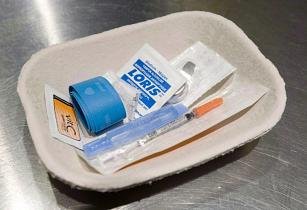Toronto Health Board Being Asked to Make Prescription Heroin Part of Overdose Plan
The Toronto Board of Health is being asked to endorse a comprehensive overdose action plan that includes expanded use of prescription heroin as a substitute treatment for opioid drug addicts.
The Toronto Overdose Action Plan, developed after public consultation, calls on the province to work with health professionals “to expand the availability of on-demand opioid substitution treatment options.â€
That includes “supporting the provision of injectable diacetylmorphine (prescription heroin) and/or hydromorphone, according to best practice, at appropriate health settings,†says a summary of the report posted on next Monday’s board of health meeting agenda.
The federal government has approved prescription heroin through a special access program. Doctors apply through the program for a patient and, once approved, would supervise the patient injecting the drug at Toronto Public Health/The Works site, which already provides methadone and other treatments.
“Drug overdoses are an urgent public health issue that is having a devastating impact on individuals, families and communities," Dr. Barbara Yaffe, Toronto's acting medical officer of health, said in a news release.
"Our Overdose Action Plan builds on the work already underway in our community, identifies new areas for action at the local level and recommends actions for the provincial and federal governments."
Toronto has had a 73 per cent increase in reported overdose deaths over the past decade.
Councillor Joe Cressy, a member of the board of health, said Monday research has shown prescription heroin as a treatment option helps reduce the risks associated with drug use in the illicit market.
In addition to reducing overdose deaths, the treatment helps reduce the transmission of HIV and Hepatitis C.
“Under a doctor’s supervision, it allows the patient to focus on their life …rather than constantly out in the illicit market looking for drugs,†and perhaps committing petty crimes to support the habit.
Cressy said the entire report is about looking at drug use through a public health lens.
“The criminal justice approach of ‘just say no’ leads further stigma, discrimination, and leads to further overdose deaths and increases costs to society as a whole,†Cressy said.
“When you look at drug use from a public health lens, you save peoples’ lives and you improve the health of not only the people who use drugs, but their neighborhoods and their community.â€
The report calls for the federal government to “implement a range of options for people who come into conflict with the law because of substance use with a main goal of avoiding arrest and prosecution†including restorative justice and community-based diversion programs.
It also calls for the federal government to allow the city to proceed with a drug-testing program at supervised injection sites and at music events.
The total cost of the action plan is $374,000. The city’s share is $94,000.
Last year, Health Canada changed regulation to allow doctors to prescribe pharmaceutical-grade heroin to chronic addicts as a last resort, citing scientific evidence and a focus on harm reduction.
The treatment is used in parts of Europe and is already being rolled out in Vancouver, which pioneered supervised injection services in Canada.
Toronto plans to open three supervised injection sites inside existing community health centres later this year.
Supervised injection allows drug users to bring in their own substances and inject under the supervision of a nurse, who monitors for signs of infection or overdose.
Health Minister Jane Philpott
has said she will work with cities looking to open what she called
evidence-based harm reduction programs following Vancouver's example.
Montreal and Ottawa are also contemplating such sites.
Comments
There are 0 comments on this post





